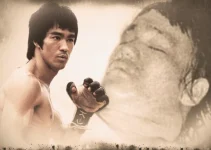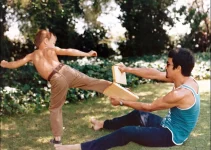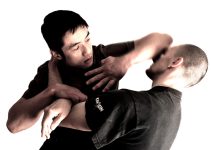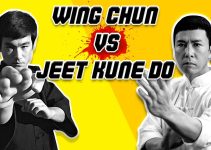Bruce Lee, born in 1940 in San Francisco and raised in Hong Kong, began his martial arts journey at a young age. He learned various disciplines, including Wing Chun, boxing, and traditional Chinese martial arts. Lee later developed his own martial arts philosophy, Jeet Kune Do, emphasizing “Using No Way As Way, Having No Limitation As Limitation.”
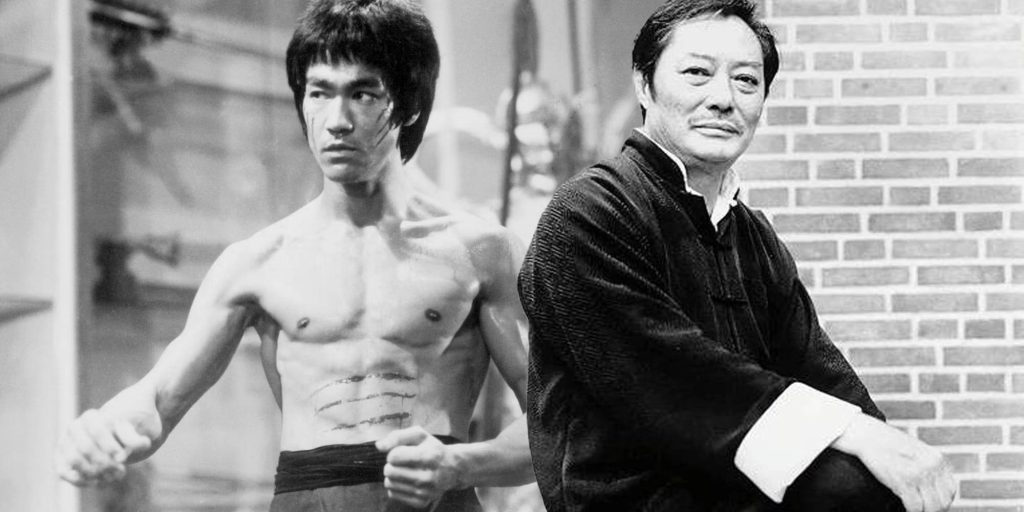
The Events Leading to the Fight with Wong Jack Man.
In 1964, Bruce Lee started teaching martial arts in the U.S., sharing his techniques and philosophy with people of all backgrounds. This sparked opposition from some members of the Chinese martial arts community in San Francisco’s Chinatown, who believed Chinese martial arts should be kept secret and taught only to Chinese individuals.
In that context, Wong Jack Man, a renowned martial artist skilled in Wing Chun and Tai Chi, became Bruce Lee’s opponent. There are various versions of why their fight occurred. Some sources suggest that Wong Jack Man challenged Bruce Lee to stop him from teaching martial arts to non-Chinese individuals. Meanwhile, other versions state that Bruce Lee challenged Wong Jack Man to demonstrate his strength and his new martial arts philosophy.
This duel was organized after Wong Jack Man sent a letter proposing the match to Bruce Lee. The letter not only challenged Bruce Lee’s martial arts skills but also responded to his public teaching of martial arts to outsiders. This was something that many Chinese martial arts masters at the time did not agree with.
The Legendary Fight with Wong Jack Man
The fight between Bruce Lee and Wong Jack Man took place in 1964 at a gym in Oakland, California, witnessed by only a few people. According to Bruce Lee, the fight lasted about 3 minutes and ended when he forced Wong Jack Man to surrender. Bruce Lee claimed that he won easily, but the fight also made him realize that his skills and martial arts style needed further refinement.
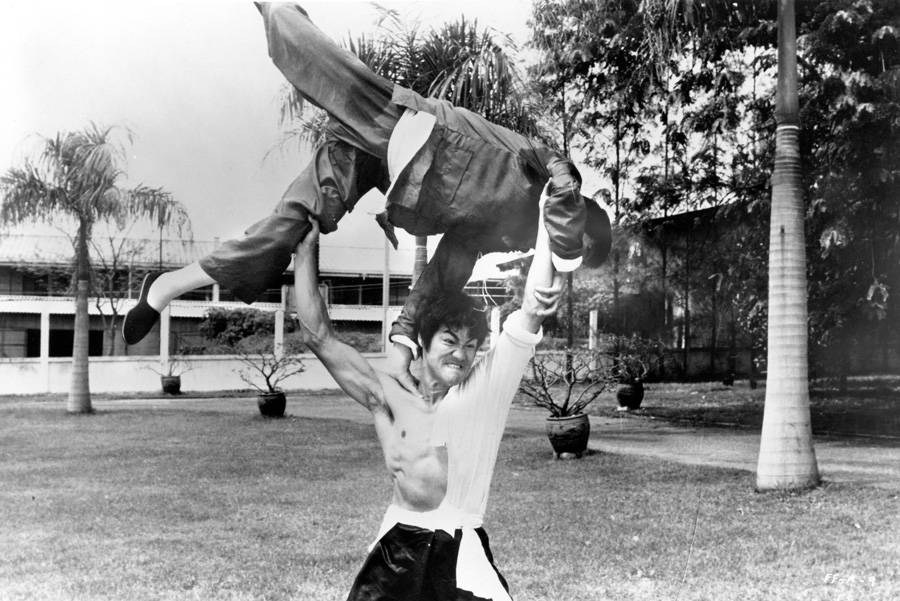
However, according to writer Rick Wing, one of the observers of this duel, the fight was not as one-sided in Bruce Lee’s favor as the martial arts legend described. Rick Wing recounted that Bruce Lee began attacking immediately after the handshake between the two. The founder of Jeet Kune Do launched a series of high-intensity punches and kicks, all of which Wong either blocked with his chest or dodged to the side.
Before the fight, Wong had declared he wouldn’t use his famous kicks for fear of permanently disabling Bruce Lee. But in the heat of battle, Wong unleashed powerful kicks at Bruce Lee, one of which caused Lee to stagger. Wong immediately jumped up and grabbed Bruce Lee’s neck but decided not to attack while his opponent was dazed.
After 20 minutes of fighting, Wong unexpectedly lost his balance and fell. Seeing this, Bruce Lee was about to pounce when the spectators intervened, fearing that an enraged Bruce Lee might seriously injure Wong. Meanwhile, Bruce Lee’s friends recounted that Wong tried to run away but was held back and knocked down by Bruce Lee.
After confiding in his wife, Linda, Bruce Lee admitted that the fight lasted longer than expected and that he couldn’t easily defeat Wong as he had planned. Feeling disappointed in himself, Bruce Lee decided to train more seriously.
Details About Master Wong Jack Man
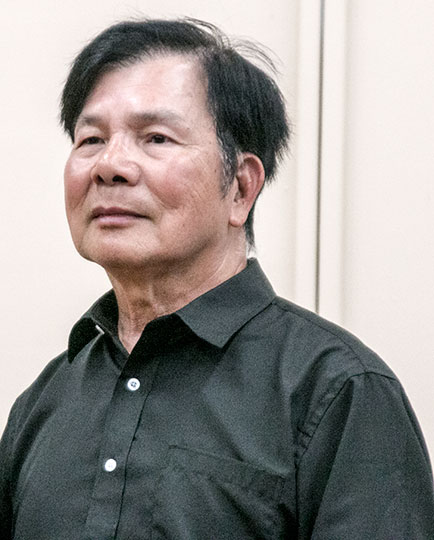
Wong Jack Man was a martial arts master born in Hong Kong who later moved to the United States. He was renowned for his skills in various martial arts, including Wing Chun, Tai Chi, and Xing Yi Quan. Xing Yi Quan, also known as Liu He Quan, is a martial art originating from the Shaolin Temple in Henan, known for its fast, powerful, and decisive strikes.
According to some sources, in his fight with Bruce Lee, Wong Jack Man utilized Xing Yi Quan, a martial art that emphasizes flexibility, speed, and close-range combat. Xing Yi Quan also encompasses a philosophy of fighting, advocating for bold actions and sudden, rapid attacks. This may have been a factor that allowed Wong Jack Man to hold his own against Bruce Lee in their match.
The Aftermath of the Fight
Regardless of the outcome of the fight, it had a significant impact on Bruce Lee. After the match, he realized that although he claimed victory (according to his account), his fighting style still had many limitations. The fight with Wong Jack Man motivated him to develop and refine the philosophy of Jeet Kune Do, emphasizing flexibility, speed, and efficiency in combat.
Bruce Lee believed that martial arts should not be constrained by rigid rules or traditional styles but should be flexible and adaptable to each specific situation. This philosophy helped him become one of the most influential martial artists and martial arts philosophers of all time.
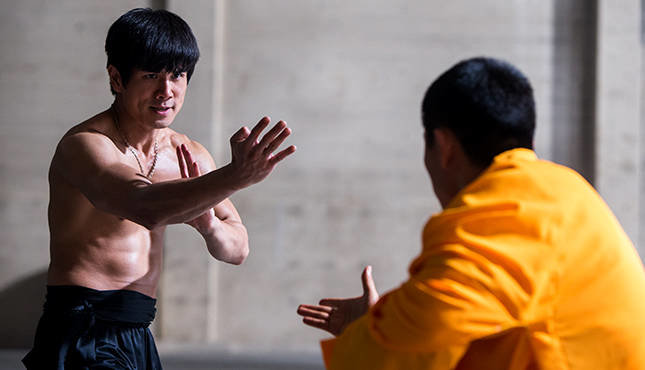
Wong Jack Man, now older, rarely mentions Bruce Lee. When Bruce Lee suddenly passed away in 1973, Wong also sent flowers as a condolence, showing respect and mourning for his former colleague.
After Bruce Lee’s death, his legacy continued to live on through his movies, books, and the martial arts schools he founded. His Jeet Kune Do philosophy changed how many people approach and practice martial arts. He paved the way for future generations of martial artists, and his contributions continue to influence many people worldwide.
In conclusion, despite the many stories and legends surrounding Bruce Lee’s fights, the truth is that he was never defeated in any official martial arts match. However, the fight with Wong Jack Man played an important role in Bruce Lee’s development, contributing to his unique martial arts philosophy and his spirit of continuous learning. What he left behind remains an endless source of inspiration, and his martial spirit will forever live in the hearts of his fans.

